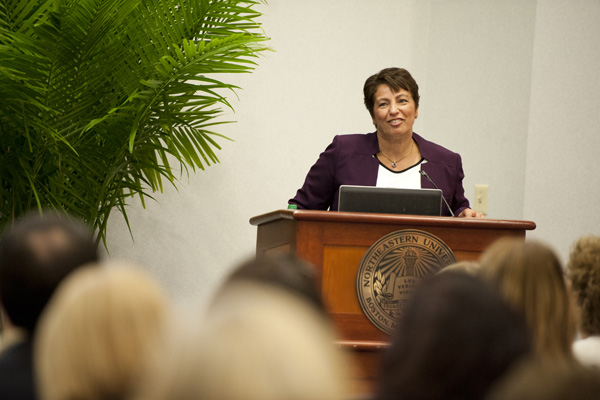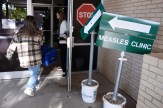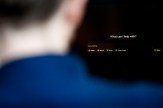The synergy between new technology and healthcare

As technology continues to become more integrated into everyday life, Northeastern’s School of Nursing in the Bouvé College of Health Sciences held a symposium Wednesday night to discuss how nurses can take advantage of information technology to improve patient care.
The symposium, titled “New Healthcare: How to Nurse IT” and held in the Raytheon Amphitheater, also highlighted how Northeastern is preparing nursing students to become leaders in their field.
Hoda Sayed-Friel, a 1980 graduate of Northeastern’s former College of Pharmacy and Allied Health, served as the keynote speaker. For the last 25 years she has worked for MEDITECH, a leading software vendor in the healthcare informatics industry, and is currently the company’s executive vice president of strategy and marketing.
“Hoda is a remarkable example of a Northeastern alumna who exemplifies the highest standards of her industry and makes every effort to give back to Bouvé on a continuous basis. We are so grateful for her support and leadership,” said Terry Fulmer, dean of the Bouvé College of Health Sciences.
Sayed-Friel reflected on the synergy between new technology and healthcare, and how nurses can respond to and take advantage of changes taking place in this area. These changes include how healthcare providers will be reimbursed for hospice care and how patients are increasingly informing themselves about their health conditions.
“Patients are becoming more educated, and they are asking better questions,” Sayed-Friel told the attendees. “And they are going to be involved, which is a good thing. We need to take time to answer those questions.”
Whether healthcare professionals are documenting preventative measures, such as flu vaccines, or engaging patients who have returned home after treatment, Sayed-Friel said technology should be part of that process. She even encouraged healthcare professionals in the audience to use new communication methods like texting and web messaging to remind them to take their medication.
“If you don’t go to them they are going to be coming back to you,” Sayed-Friel said, referencing the need to address patient compliance to prevent unnecessary and costly readmissions.
The symposium was a precursor to the School of Nursing’s 50th anniversary celebration on Nov. 2. Carole Kenner, dean of the School of Nursing, noted that health informatics and healthcare delivery has many stakeholders, including higher education, industry, nurse clinicians, and other healthcare professions.
“The technology revolution is rapidly changing how care is delivered,” Kenner said. “As Ms. Sayad-Friel illustrated, we must embrace technology. As educators we must ensure that are students continue to make care human while using data to plan and provide care.”
Northeastern and MEDITECH have created a partnership to integrate technology into nursing education, which includes developing a first-of-its-kind curriculum for disease managers and case managers.
“It’s collaborations between industry and education like the one Northeastern University and MEDITECH share that advance the innovation and integration of IT into all phases of healthcare,” said Laura Mylott, a clinical professor in the School of Nursing.
Mylott added that the School of Nursing recognized early on that health IT would play an essential role in practice education and its principals and concepts are integrated in both the undergraduate and graduate nursing curriculum. This includes electronic documentation and the use of simulation lessons to train nursing students.
“The partnership between Northeastern and MEDITECH has been enormously productive in terms of advancing educational opportunities of high fidelity simulation,” Mylott said.





